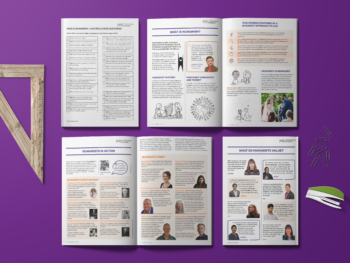 Humanists UK has today relaunched its hugely successful Understanding Humanism website for schools. The website features over 100 new resources for teachers and students, including information sheets, presentations, activities, films, assessment ideas, and humanist perspectives on a wide range of questions and topics. Teachers will find content for ages 5-18, with the material at each age range building on the previous, supporting students to develop a rich knowledge about humanism as part of a high-quality and inclusive education about religions and worldviews.
Humanists UK has today relaunched its hugely successful Understanding Humanism website for schools. The website features over 100 new resources for teachers and students, including information sheets, presentations, activities, films, assessment ideas, and humanist perspectives on a wide range of questions and topics. Teachers will find content for ages 5-18, with the material at each age range building on the previous, supporting students to develop a rich knowledge about humanism as part of a high-quality and inclusive education about religions and worldviews.
Since its launch in 2016, tens of thousands of people have visited the Understanding Humanism website, viewing and downloading its resources hundreds of thousands of times. Humanists UK’s school speakers have made over 1,500 visits to schools, speaking to over 160,000 students. Teachers gave them an average rating of 4.9 out of 5 in 2021. Humanists UK also supports over 300 teachers a year through its teacher training courses. Having consulted with and listened to teachers about their needs, the new and updated content aims to provide material that will support teachers to even more effectively deliver accurate, high-quality teaching about humanism.
The new resources have been organised into five core areas of knowledge to help teachers to break up the humanist approach to life into manageable chunks to support students’ learning:
- Human beings: our origins, our nature, and our potential;
- Understanding the world: science and reason;
- The one life: freedom and happiness;
- Humanist ethics: empathy and the welfare of sentient life; and
- Society: humanist action, goals, and human responsibility.
Students will have the opportunity to explore questions such as ‘How do humanists decide what to believe?’, ‘Can you be good without a god?’, and ‘How do non-religious people find meaning and happiness?’ There are also new resources on the history of humanism and its influence on the modern world. The content has been designed to give students the opportunity to explore, discuss, and critically evaluate the humanist approach to life.
Director of Understanding Humanism Luke Donnellan said:
‘We’re delighted at the success of Understanding Humanism since its launch, and the positive feedback it has received from teachers. But we wanted to make it even better. Following conversations with teachers over the past few years, we’ve developed a better understanding of their needs, and how the core knowledge about the humanist approach to life can be presented most effectively.
‘The resources now provide a coherent plan of learning across the age ranges. They’ve also been designed to steer teaching about the non-religious towards the things non-religious people do believe, rather than the things they don’t, supporting students to develop a richer understanding of non-religious approaches to life. We encourage teachers to visit the website and hope they find the resources useful.’
Notes:
For further comment or information, please contact Director of Understanding Humanism Luke Donnellan at luke@humanists.uk or phone 020 7324 3070.
Visit the Understanding Humanism website.
What is humanism?
Humanism is a non-religious worldview. Humanists believe that this life is the only life we have, that the universe is a natural phenomenon with no supernatural side, and that we can live ethical, meaningful, and fulfilling lives on the basis of reason and humanity. They trust the scientific method when trying to understand how the universe works, make their ethical decisions based on a concern for the welfare of human beings and other sentient animals, and seek to make a positive contribution towards building a better society.
Humanists UK is the national charity working on behalf of non-religious people. Powered by 100,000 members and supporters, we advance free thinking and promote humanism to create a tolerant society where rational thinking and kindness prevail. We provide ceremonies, pastoral care, education, and support services benefitting over a million people every year and our campaigns advance humanist thinking on ethical issues, human rights, and equal treatment for all.
